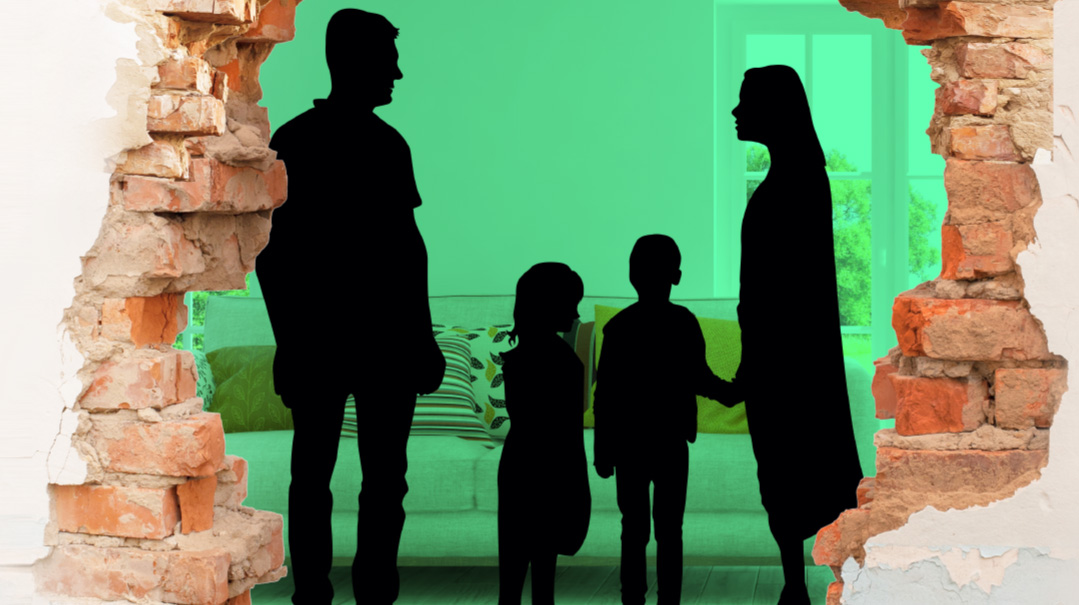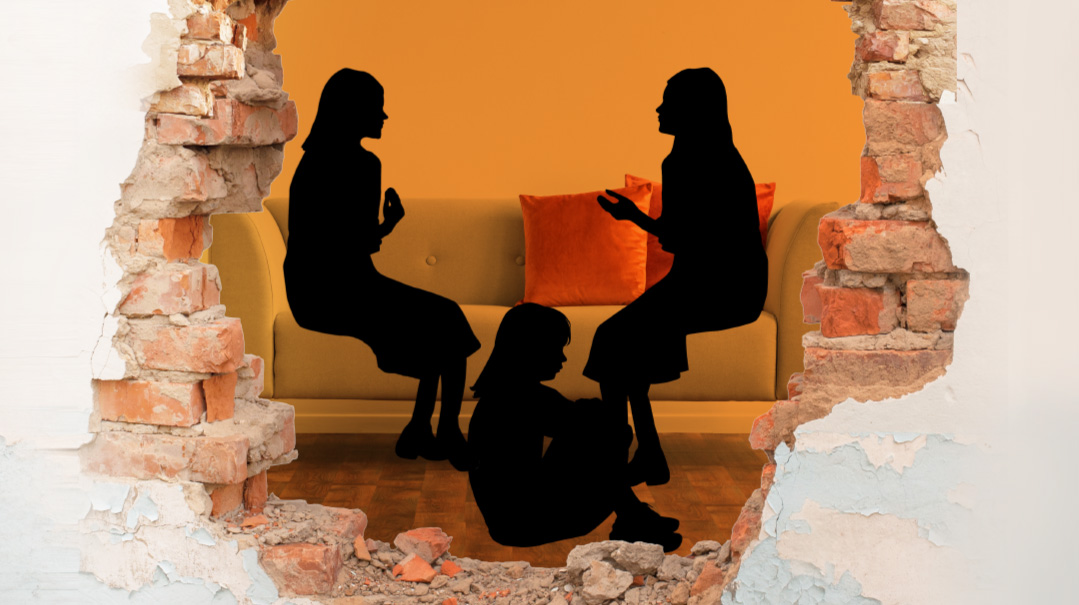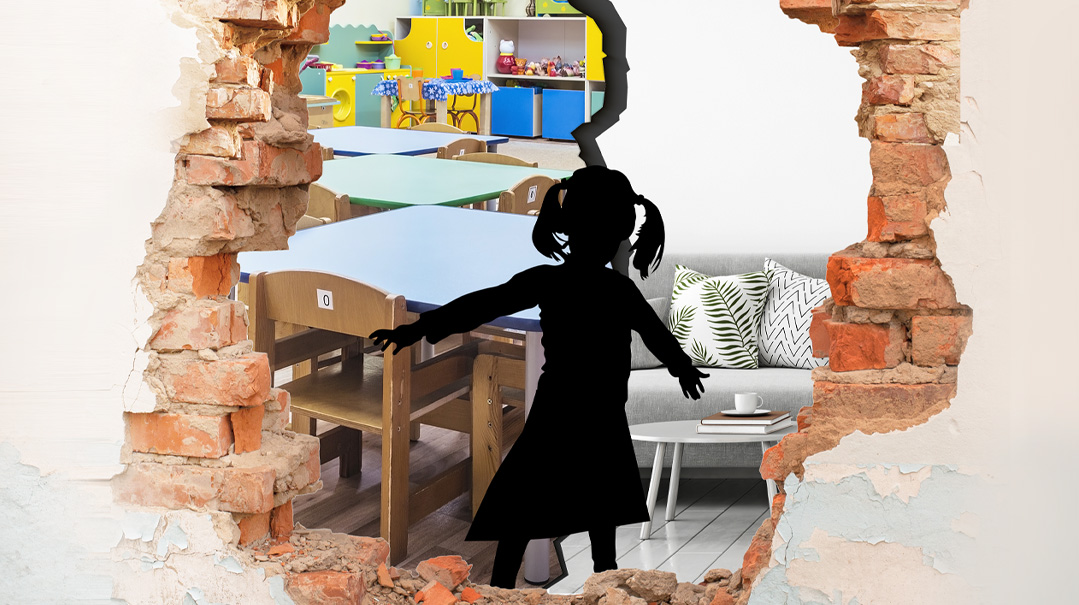“My Son Needs Therapy. My Husband Says No”

I’m worried that without help, this will spiral into even more dysfunctional behavior as he gets older

Moderated by Faigy Peritzman
MY oldest son is a smart and energetic eight-year-old. He does well in school, and his rebbi says the boys in the class like him. But at home he acts very differently. He has a hair-trigger temper, often having meltdowns when things don’t go his way, and lashing out at me or his younger siblings. The intensity of his tantrums frighten me.
I want to send him to therapy to help him learn healthier ways to respond when frustrated and to discover if there’s anything more worrisome at the root of all this anger.
But my husband is completely unfazed by our son’s behavior. He tells me that many boys get angry easily, and he’s adamant that his son does not need therapy. When I point out examples of my son’s inappropriate reactions, he just shrugs and tells me he’ll grow out of it.
I’m worried that without help, this will spiral into even more dysfunctional behavior as he gets older.
Do I force the issue and have it become a conflict between my husband and me, or should I just hope his behavior will change as he gets older?
Rabbi Efrem Goldberg is the Rav of the Boca Raton Synagogue, a rapidly growing community of close to 1,000 families in Boca Raton, Florida.
Rav Yaakov Kamenetsky once ran into a talmid and inquired about how he was doing. The young man gave a krechtz, explaining that his child had kept him up several nights in a row. “Tzaar gidul banim,” he sighed. The great gadol turned to his talmid and said, “That isn’t tzaar gidul banim, the pain of child rearing, it is just gidul banim, child rearing.”
The essential question, the point of debate between the two of you is: When do behaviors, thought patterns, or phobias rise to the level of a clinical diagnoses, and when are they normative and regular? When do they need intervention and treatment, and when do we assume the person exhibiting them will grow out of them? When are they gidul banim, and when are they tzaar gidul banim?
The line between outlier behavior that should be cause for concern and more standard behavior, where there’s nothing to be particularly worried about, is often very fine and difficult to see. But here’s the thing that I believe you must try to communicate to your husband: If you observed your child frequently losing his balance or experiencing dizziness, would you dismiss it as a growing pain, something he will grow out of? Or would you — at minimum — seek the opinion of a physician, asking a qualified and trained person to make that judgment?
What is true for physical imbalance or spatial dizziness is equally true for mental imbalance and emotional dizziness. Though shalom bayis is a core value and you correctly should be committed to harmony with your husband, when it comes to your child’s physical, mental, and emotional health, there must be no shame, no stigma, and no hesitation in impressing upon him the importance of asking an expert and deferring to the guidance you receive.
The Torah tells us (Shemos 21:19) “verapo yerapei — and shall cause him to be healed,” from which the Gemara (Berachos 60a) learns, “mi’kan she’nitein reshus l’rofei l’rapos — from here we learn that permission is granted to a doctor to heal.” In other words, the practice of medicine, seeking out the treatment of a doctor, is consistent with the will of Hashem. Why would we think it isn’t? Rashi (Bava Kama 85b) explains, “I might have thought that if someone is ill, physically or mentally, that is what Hashem wants, and we are obligated to accept it. So the Torah tells us no, Hashem has given doctors license and responsibility to heal.”
The Shulchan Aruch (Yoreh Dei’ah 336:1), goes even further and writes, “The Torah has given permission to the doctor to heal. It is a mitzvah to do so and part of pikuach nefesh. If a doctor refuses to do so, he is guilty of bloodshed.” Many poskim, including the Tzitz Eliezer (12:18:8) and Rav Asher Weiss (Minchas Asher 2:134), apply the halachic principles and rules of physical health to mental health.
So, in the case of your question — are these ordinary tantrums, incidents of adolescent impetuousness, or is there clinical anger and rage? — a competent doctor must make that determination. Even if it is awkward or outside your comfort zone, for your son’s well-being, you should get to the bottom of the behavior.
How should you convince your husband? You should communicate in a non-adversarial way, engaging and positioning your husband as your partner, on the same side and part of one team, equally devoted to your son’s wellbeing. You should implore him to help. Follow your maternal instinct on this issue; though your husband may be right that this is something your son will grow out of, it is fair and reasonable for you to want a professional to endorse that. After all, if he’s right, there is no harm in having an expert say there is nothing more to do. But if he is wrong, your son will pay a price by his indifference and passiveness. You should calmly communicate that you’re asking him to partner and respect you on this, not only for the sake of your son, but also for the sake of you shalom bayis, to preserve the harmony that is good for you, your son, and the whole family.
If or when he goes along, your husband must not let your son know he’s doing so begrudgingly or under protest. The ben sorer u’moreh, the rebellious child, is described by the Torah as einenu sho’meiah b’kol aviv u’v’kol imo, he doesn’t listen to the voice of his father and the voice of his mother. Why doesn’t the Torah simply say he doesn’t listen to the voice of his father and mother? Why does it repeat the word “voice” for each? Commentators explain that part of what contributes to a rebellious child is inconsistent messaging from his parents. When a child hears different voices from his father and mother, when he perceives daylight between them, he is often lost, confused, and becomes rebellious.
Confronting potential challenges with our children can push us apart or make us grow closer together. The choice of having parenting problems or compounding them with marital strife is up to us. If we are committed to speak with one voice, to respect each other’s opinions but defer to outside guidance when we don’t agree, we can not only do what is best for our children but develop a better marriage in the process.
Dr. Miri Korbman is a licensed clinical psychologist. She currently works at the Center for Cognitive and Dialectical Behavior Therapy in New York, where she specializes in providing evidence-based treatments for children, teens, young adults, and families.
It makes sense that you are concerned and conflicted. Parents often wonder whether tantrums can remit without intervention and don’t always agree about whether to get help when a child is struggling.
As you and your husband are making this determination, consider the following: For how long have these tantrums been occurring? How frequent and intense are they? Are they harmful or destructive? How are they set off and resolved? If this behavior has been going on for a while, is getting worse over time, and is negatively impacting your family, it is likely time to seek outside help.
To add clarity to your decision, let’s explore how therapy could help and what it might entail, and perhaps this can make the picture clearer when you and your husband are discussing this option. A therapist can help you identify what’s causing your son’s tantrums when they occur (i.e., at home) and what helps him manage his emotions at other times (i.e., in school).
While it’s great that your son is doing well in school, this may be confusing and contribute to your and your husband’s opposing perspectives. However, children sometimes act differently in different settings. Your son may experience distress during the day and “keep it together” at school to avoid getting in trouble or feeling embarrassed in front of his peers, but he is then more vulnerable to acting out at home. While it’s understandable to hope he might outgrow these behaviors, if you feel you’re afraid to upset him, your son is probably not feeling too great about his behavior, either. Seeking support is in your son’s best interest as well as your own.
A therapist can also help you gain a deeper understanding of your son’s emotions and behaviors in order to help improve your dynamic. Tantrums and oppositional behavior result from a transaction between a child’s emotional state or temperament and his environment. Some kids experience emotions more quickly and intensely, take longer to “get over” things, and have difficulty tolerating changes or following rules. They might scream, cry, or lash out at others when upset. Parents may resort to punishment or escalate in return, which may work at first, or may make things worse. Alternatively, parents (understandably!) respond by giving in to defuse or prevent a tantrum. Children may then tantrum in order to be soothed or to get out of an unpleasant task, creating a coercive cycle.
Imagine your son is reading quietly close to bedtime. When you tell him to stop reading and get ready for bed, he starts to whine. Anticipating a meltdown, you retreat. Soon, you try again. He starts to kvetch, you stand firm, he screams, “No!!!” and the tantrum begins. You fear he will wake his siblings (and the neighbors), so you say “Fine! I’ll pick my battles!” and leave him alone, or try to calm him down or read to him until he falls asleep. If this becomes a pattern, you’re likely to hesitate to enforce bedtime, and he’s likely to escalate to tantrum behavior sooner to avoid obeying.
To be clear, your son is not being intentionally manipulative; he is merely doing what works to meet his needs. And you are not causing these tantrums; in fact, you may have excellent parenting techniques that work well with your other children and have even worked with your oldest son until now, making your situation even more frustrating. It makes sense that your behavior is impacted by your son’s tantrums. The good news is that changing your behavior can help change his.
Therapists who practice evidence-based approaches backed by research such as parent management training, dialectical behavior therapy for children, or other cognitive behavioral interventions will help you to recognize this cycle and employ specific strategies to increase your son’s positive behaviors and decrease tantrums. This may include identifying rewards for and praising “good” behavior and enforcing fitting consequences in other cases. Therapy will also help your son to identify and manage his emotions more effectively, express distress verbally rather than through behavior, and tolerate rules and limits more consistently.
Smart and energetic kids can excel in many areas, and I am sure your son does, too. As parents, both you and your husband want your child to maximize his potential. Targeting these issues through therapy can help both of you increase your child’s positive qualities and strengthen your relationship with him. I hope that this glimpse into the therapy process can help guide you and your husband toward a joint decision about utilizing these opportunities.
Wishing you much hatzlachah!
Eliav Friedman, MSW works in private practice in RBS-A and Yerushalayim as well as over Zoom. He specializes in working with teens, parental guidance, and abuse. Eliav also gives parenting classes and workshops.
I applaud you for your dedication to your son’s needs and your simultaneous dedication to your shalom bayis. You’re stuck between a rock and a hard place and are understandably unsure what to do. While your dilemma is clear, there are details that are left out of your letter that may be meaningful.
It’s difficult to assess the severity of your son’s outbursts based on your letter, and I therefore cannot weigh in on whether or not they are normal behaviors for a boy his age. I don’t know how you’ve responded to your son’s outbursts. It’s also unclear to me if your husband is against therapy in general, if he believes in therapy in general but can’t swallow the notion of his son going to therapy, or if he is simply convinced that your son doesn’t need such help at this point. Regardless, he is unwilling to send your son at this time, and therefore you don’t really have that option (unless you want to “force the issue”).
My inclination is to trust a mother’s intuition that her son needs help. At the same time, I’m a believer in minimalizing intervention to the extent possible. The question therefore is: What sort of help does your son actually need?
The fact that your son is doing well in school both academically and socially and that his struggles are at home may be a good sign. It often means that home is a safe place for him, a place where he can let go and express what’s going on inside. It’s also possible that there is something specifically at home that is triggering him. Understanding which is the case — or if it’s a combination of both — will be instrumental in determining how to best help him.
Your description of your son is one of a young boy struggling with emotional regulation. He gets triggered and flies into a rage. He then struggles to control himself — and from the sound of things, you struggle to contain him as well.
With apologies to my colleagues who do wonderful work with children this age, I would rarely recommend sending a child so young to therapy. (To be clear, there are cases in which I would recommend it, but they are the exception, not the rule.) Many of my most difficult clients were young men who had been in therapy as young children and whose experiences in therapy unfortunately made my work more challenging, not less so.
There are a number of potential reasons for this. (This topic deserves a broader treatment; due to space constraints we’ll have to suffice with a too-brief explanation). Firstly, the blessed decrease in stigma surrounding therapy in our community notwithstanding, sending a child to therapy can still negatively impact his self-esteem. Second, finding the right therapist is akin to making a shidduch; when the match doesn’t work — for whatever reason — it can too easily leave a bad taste in the child’s mouth, creating a bias against other therapists. Additionally, when children are exposed to ideas before they are mature enough to appreciate them, they can come to discount these ideas and become unwilling to reconsider them from a more mature vantage point.
For example, many children are introduced to healthier eating or sleeping habits but are not mature enough to change their habits. Because they haven’t been convinced, they continue unhealthy habits, and believe there is no reason to do otherwise, as the arguments put forth to them were unconvincing. If I was asked to help 100 teens change their eating or sleeping habits, the most difficult customers would be those who had already heard the arguments and had not been swayed; they would see no reason to even consider what I was saying.
Therefore, I generally recommend that it be the parents who go for guidance — or even therapy. There they’ll learn to better understand their child, what’s driving his behavior, and how to help him learn the skills necessary to better handle his challenges. Please consider that this benefits not only the child in question, but all of the children in the family.
Before considering sending your son to therapy, I would see if there isn’t more that you can do for him at home. This may mean developing some new skills as a parent. If your husband will join you in this process, it would certainly be beneficial. There are many books that you can read on helping children with emotional regulation. In particular, I like those that are meant to be read with your child. If you feel it necessary, there are also many excellent therapists and chinuch personalities in our community with a wealth of experience who can help you better understand your son’s behavior and help you learn how to help your son develop the skills he needs to manage his feelings in an adaptive way.
If you’ve invested serious time and effort in this process and don’t see progress, then I would recommend reconsidering sending him to a professional.
Wishing you hatzlachah rabbah and much nachas from all of your children.
(Originally featured in Family First, Issue 795)
Oops! We could not locate your form.







